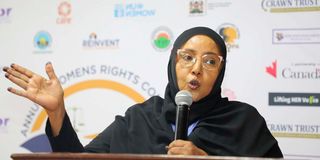'They called me mad': MP Sophia Abdi's bold stand against the cut

Former Ijara MP Sophia Abdi during the Annual Women Rights Convention organised by Crawn-Trust at Panari Hotel on August 23, 2023.
What you need to know:
- Former MP Sophia Abdi survived a horrific FGM ordeal that killed four of her peers.
- Her election as the first woman MP from North Eastern region in 2007, elevated her fight, leading to the creation of the Prohibition of Female Genital Mutilation Act, which has helped reduce FGM prevalence.
In a remote village in Ijara Constituency, a chilly morning decades ago would forever change Sophia Abdi's life. As one of ten young girls subjected to female genital mutilation (FGM) that day, she witnessed unimaginable horror as four of her peers lost their lives to excessive bleeding. Sophia herself barely survived the ordeal.
"I faced a lot of ridicule, discrimination and threats when I began my campaign to fight this menace," Sophia recalls during a media breakfast meeting organised by the Anti-FGM Board in Nairobi.
"People would call me a mad woman. Even my mother, who believed she had raised me well, thought I had lost my mind. She brought in sheikhs to pray for me."
Despite the opposition, Sophia persevered. For 12 years, she tirelessly campaigned against FGM, raising awareness about its dangers and devastating effects. Her breakthrough came when she successfully recruited a respected sheikh to support her cause, helping to shift community perspectives.
Her advocacy took a significant leap forward when she made history as the first woman from the North Eastern region to be elected as a Member of Parliament for Ijara constituency in 2007.
During her tenure in the 10th Parliament, she played a crucial role in developing the Prohibition of Female Genital Mutilation Act.
"The pain I experienced, which I still feel to this day, drove me to be part of the team that created a law to end this practice," she explains. Today, as a member of the National Council for Children's Service, Sophia continues to witness the positive impact of the legislation she helped create.
The Prohibition of Female Genital Mutilation Act, enacted in 2011, mandates a minimum three-year imprisonment and a Sh200,000 fine for offenders. It also established the Anti-FGM Board, a government agency dedicated to coordinating initiatives, creating awareness, and advocating against the practice.
The results are encouraging. According to the Anti-FGM Board, since 2018, there have been 303 arrests, 300 court cases, and 55 convictions. The Kenya Demographic and Health Survey (KDHS) 2022 shows FGM prevalence has dropped to 15 per cent among females aged 15-49, down from 21 per cent in 2014.
The impact of the law extends to former practitioners like Carol Saoli from Polonga village in Narok North. A survivor herself at age 13, Carol later became a cutter, charging Sh1,500 per procedure. However, the new law prompted her to abandon the practice.
"After the enactment of the law, it became very difficult to continue with the cutting of girls," Carol explains.
"Many cutters and parents were arrested. I had to find a different economic activity that wouldn't put me in trouble with the law." Now, she champions anti-FGM awareness in the Maasai community.
The younger generation is also benefiting from these changes.
Jacinta Merinok, a Second Year tourism management student in Narok, credits the anti-FGM campaign for her escape from the practice.
My parents refused to subject me to the cut because they feared arrest. That's how I survived and was able to pursue my studies," she says.
Jacinta now dedicates her weekends to conducting anti-FGM awareness campaigns in schools, churches, and public forums.
The law's significance was put to the test in 2017 when a public health professional filed a constitutional petition challenging its validity. The petition specifically targeted Sections 5, 19, 20, and 21 of the Act. Section 5 establishes the Anti-FGM Board as the government's coordinating body for anti-FGM efforts, while Sections 19 through 21 outline the criminalization of FGM and prescribe penalties for offenders.
In a landmark 2021 ruling, a three-judge High Court bench in Nairobi upheld the law's constitutionality. Justices Lydia Achode (presiding), Margaret Muigai, and Kanyi Kimondo found that the petitioner failed to prove their allegations of unconstitutionality. The bench emphasised that revoking the anti-FGM law would leave women in Kenya vulnerable, depriving them of crucial legal protections against this harmful practice. Their decision reinforced Kenya's commitment to protecting women and girls while promoting positive cultural practices.
While progress has been made, advocates like Carol warn that vigilance is still needed, particularly regarding the medicalisation of FGM. However, with committed champions like Sophia Abdi leading the way, and strong legal frameworks in place, Kenya continues its march toward completely eradicating this harmful practice.




